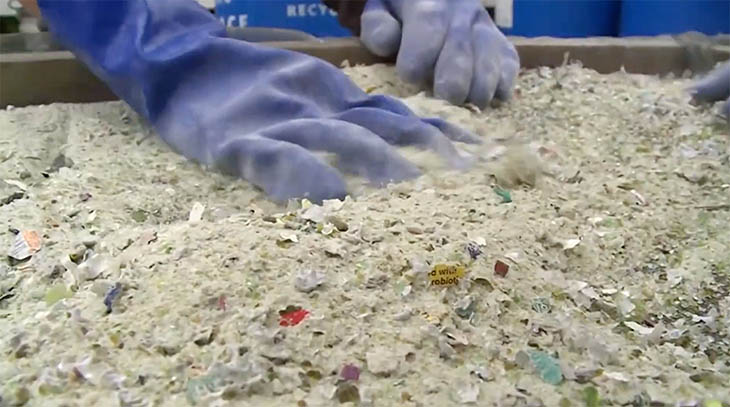
Broken bottles are often collected and recycled to make new materials. However, some people just let the bottles sit in storage for years and not do anything about it. It takes an entrepreneurial and innovative mind to figure out new uses for these old bottles.
The college seniors who hail from New Orleans definitely thought outside the box to fix the city’s problems. Bottles no longer stay idly on a shelf with a new project they created, and we can only hope that they set an example that the rest of the world can emulate.
For this college seniors, the glass is never half empty. In fact, it’s always half full. The whole project began during a conversation over a bottle of wine. These youngsters knew that the glass they had finished would simply end up in a landfill. They didn’t want that, and so began the pair’s non-profit glass recycling service.
This is quite a simply project that’s also very effective. What the pair does is collect glass bottles and grind them until these become super soft sand that they are able to utilize for disaster relief, eco-construction, and even new glass.
They have named the project Glass Half Full and this is tackling problems that many of municipalities in the U.S. have stopped offering. They are now doing glass recycling in New Orleans. Their recent efforts paid off because they were recognized for what they’ve done and became the recipients of The Most Innovative Program Award from the Keep Louisiana Beautiful Conference.
As for the U.S. itself, the country is veering away from curbside glass recycling. This has posed too many problems in the past because the glass they receive is oftentimes contaminated, or it breaks apart and becomes a contaminant in other waste streams like metal and paper.
When it comes to issue of recycling, glass is actually 100% reusable. Unfortunately, only a quarter of glass in the U.S. is recycled and put to good use. As for the rest, these end up in landfills or these remain untouched in the next few years.

When Glass Half Full entered into the picture, they became largest grassroots recycling program in the world. The organization is actually funded mostly by donations made from people all over. What they do is collect glass either from businesses curbside or from their specified drop-off points. Then they bring what they collected to a processing facility. This is where the glass is sorted, cleansed of metal and cork objects, pulverized, and turned into sand of varying colors. The sand then is piled into sandbags, heated into new glass objects, or sold to a variety of corporations who focus on eco-construction.
Glass Half Full is now 90 percent on the way to completing their fundraiser. Their eventual goal is to scale-up their operations. “A single piece of glass in your recycling bin in NOLA will cause the entire load to be sent to the landfill, where it will never decompose,” said a Glass Half Full representative. They also added, “New Orleans wastes millions of tax dollars… importing millions of pounds of sand. We are preventing these unnecessary, wasteful, and expensive practices by providing a sustainable alternative.”
The organization sees the bigger picture of all their efforts. They see their sand as a lot more potential than just making new wine bottles from these. They ultimate goal is to help restore Louisiana’s shoreline with use of recycled glass items. This is their answer to the worldwide sand shortage. That’s because excavating for sand is an extremely long and laborious process. It’s also detrimental to the riverine and the other ecosystems that are found close to mining areas.
“Sand is a crucial tool for rebuilding the barrier islands and sandbars that protect our coast from tropical storms and hurricanes,” the organization writes. They pointed out the fact that much of the flood prevention systems Louisiana has built over time is to stop sediment from flowing out into the Gulf and the other coastal ecosystems nearby.
They said, “Returning sediment to wetlands combats erosion and promotes the return of native foliage and wildlife, which will ultimately strengthen Louisiana’s economy and preserve our food supply.”
For those who live in New Orleans and would want to take part in the company or in glass recycling, the organization’s website has answered all the FAQs people wonder.
What are your thoughts? Please comment below and share this news!
True Activist / Report a typo


